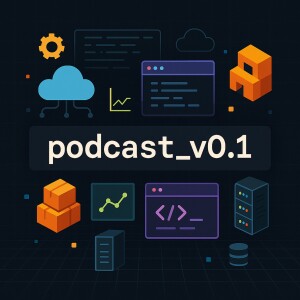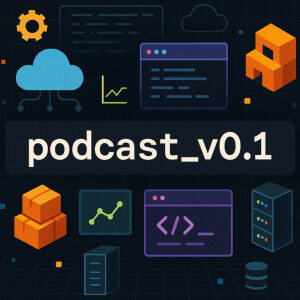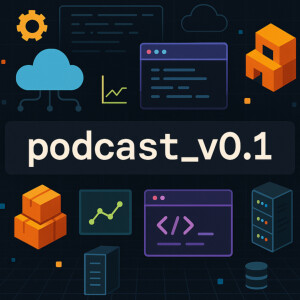podcast_v0.1
Boost your Software Engineering, DataOps, and SRE, career. podcast_v0.1 decodes the latest vital research, delivering essential insights in an easy audio format. Stay ahead of trends, inform your technical decisions, and accelerate your professional growth. Essential knowledge for curious engineers.
Episodes

Thursday May 08, 2025
Thursday May 08, 2025
Microservice architectures, while beneficial, can be notoriously complex to understand and visualize. Static analysis tools aim to automatically recover this architecture, crucial for development, maintenance, and CI/CD integration. This episode explores a new study that benchmarks nine static analysis tools, assessing their accuracy for microservice applications. The research uncovers varied performance among individual tools but highlights a powerful discovery: combining their outputs significantly boosts accuracy. Learn how this synergistic approach can elevate the F1-score from 0.86 for the best single tool to an impressive 0.91. We'll also touch on the challenges in tool reproducibility found by the researchers and the study's focus on Java Spring applications. Tune in to find out how you can achieve a more comprehensive and accurate view of your microservice landscape.Read the original paper: http://arxiv.org/abs/2412.08352v1Music: 'The Insider - A Difficult Subject'

Wednesday May 07, 2025
Wednesday May 07, 2025
Think your CI/CD optimization is on point? New research suggests we might be looking in the wrong place, revealing that your pipeline likely fails far more, and much earlier, than you realize—with a staggering 5:3 pre-merge to post-merge failure rate and 15 times more pre-merge checks. This episode unpacks the concept of "good" failures (early, cheap pre-merge fixes) versus "bad" ones (late, costly post-merge disruptions), arguing that these early issues are crucial signals. We explore why the pre-merge stage, often overlooked despite its high activity, is a goldmine for low-risk, high-impact improvements to development speed, cost, and overall quality. Learn how focusing on these "good" failures can improve developer productivity and shift CI/CD strategy from merely chasing faster builds to proactively ensuring quality where fixes are cheapest and most impactful. The discussion redefines CI/CD process milestones—pre-merge, post-merge, and post-release—and highlights how the impact and accountability for failures shift across these critical phases. Ultimately, this challenges the common focus on post-merge optimization, urging a strategic shift to leverage these numerous pre-merge "good" failures as key opportunities for building robust systems.Read the original paper: http://arxiv.org/abs/2504.11839v1Music: 'The Insider - A Difficult Subject'

Tuesday May 06, 2025
Tuesday May 06, 2025
Discover how CERN secures the vital Kubernetes cluster powering its massive CMS particle physics experiment using key cloud-native tools. This episode explores their real-world implementation of Network Policies via Calico for fine-grained internal firewalling between microservices. We delve into their use of Open Policy Agent (OPA) Gatekeeper to enforce custom rules on resource creation, ensuring compliance *before* deployment. Understand their shift to HashiCorp Vault for robust, centralized, and encrypted secrets management, moving beyond basic K8s secrets. Learn how these technologies form a layered defense strategy against modern threats. We also cover practical details like specific OPA policies and the seamless Vault Agent Injector pattern.Read the original paper: http://arxiv.org/abs/2405.15342v1Music: 'The Insider - A Difficult Subject'

Sunday May 04, 2025
Sunday May 04, 2025
Running Kubernetes on your own hardware offers power but also complexity, forcing choices about core components. Think of deployment tools as "distributions," similar to Linux, packaging K8s with opinions and tooling. This episode dives into a comparison of popular on-prem K8s distributions: the minimalist `kubeadm`/Kubespray, the integrated OpenShift/OKD, and the versatile Rancher (K3S/RKE2). We explore how they differ significantly in deployment methods, feature sets, operating system integration, and built-in components. Discover the fundamental trade-offs between the raw flexibility of minimal setups and the convenience of opinionated, "batteries-included" platforms. Understand the core philosophies behind each option to help you decide which on-prem Kubernetes flavor best suits your team's needs and infrastructure.Read the original paper: http://arxiv.org/abs/2407.01620v1Music: 'The Insider - A Difficult Subject'

Sunday May 04, 2025
Sunday May 04, 2025
Tired of sluggish flight booking systems? This episode explores a research paper proposing a fix: combining edge computing with a microservices architecture for airline reservations. Learn how moving time-sensitive tasks like seat availability checks closer to the user can dramatically reduce latency, potentially by 60%, enhancing responsiveness. We discuss the conceptual framework using Kubernetes for orchestration and Kafka for real-time data synchronization between distributed edge nodes and the central cloud. Discover the simulated performance gains in latency and throughput reported by the researchers. We also unpack the significant challenge of maintaining data consistency in such a distributed system. Explore how this edge-enabled microservice approach might apply beyond airlines to other real-time, latency-sensitive domains.
Read the original paper: http://arxiv.org/abs/2411.12650v1
Music: 'The Insider - A Difficult Subject'

Saturday May 03, 2025
Saturday May 03, 2025
Tackling network intrusions on distributed edge systems without compromising user privacy is a major engineering challenge. This episode unpacks a research paper proposing a novel solution using Federated Learning integrated with Apache Spark and Kubernetes. Explore how this architecture allows collaborative model training for anomaly detection directly on edge devices, keeping raw data local and secure. We discuss its impressive accuracy on both general network traffic and specialized automotive attack datasets. Discover the clever use of adaptive checkpointing based on the Weibull distribution to enhance fault tolerance in real-world conditions. Understand the practical benefits of this scalable, robust framework for securing modern edge computing infrastructure.Read the original paper: http://arxiv.org/abs/2503.05700v1Music: 'The Insider - A Difficult Subject'

Wednesday Apr 30, 2025
Wednesday Apr 30, 2025
Discover how the standard Kubernetes Cluster Autoscaler's limitations in handling diverse server types lead to inefficiency and higher costs. This episode explores research using convex optimization to intelligently select the optimal mix of cloud instances based on real-time workload demands, costs, and even operational complexity penalties. Learn about the core technique that mathematically models these trade-offs, allowing for efficient problem-solving and significant cost reductions—up to 87% in some scenarios. We discuss how this approach drastically cuts resource over-provisioning compared to traditional autoscaling. Understand the key innovation involving a logarithmic approximation to penalize node type diversity while maintaining mathematical convexity. Finally, we touch upon the concept of an "Infrastructure Optimization Controller" aiming for proactive, continuous optimization of cluster resources.
Read the original paper: http://arxiv.org/abs/2503.21096v1
Music: 'The Insider - A Difficult Subject'

Tuesday Apr 29, 2025
Tuesday Apr 29, 2025
Running Kubernetes in the cloud? Your network bill might hide a costly surprise, especially for applications sending lots of data out. A recent study revealed that using a managed service like AWS EKS could result in network costs 850% higher than a comparable bare-metal setup for specific workloads. We break down the research comparing complex, usage-based cloud network pricing against simpler, capacity-based bare-metal costs. Learn how the researchers used tools like Kubecost to precisely measure network expenses under identical performance conditions for high-egress applications. Discover why your application's traffic profile, particularly outbound internet traffic, is the critical factor determining cost differences. This analysis focuses specifically on network costs, providing crucial data for FinOps decisions, though operational overhead remains a separate consideration. Understand the trade-offs and when bare metal might offer significant network savings for your Kubernetes deployments.Read the original paper: http://arxiv.org/abs/2504.11007v1Music: 'The Insider - A Difficult Subject'

Monday Apr 28, 2025
Monday Apr 28, 2025
Tired of Kubernetes HPA struggling with complex microservice scaling, leading to overspending or missed SLOs? This episode dives into STaleX, a novel framework using control theory and ML for smarter auto-scaling. STaleX considers both service dependencies (spatial) and predicted future workloads (temporal) using LSTM. It assigns adaptive PID controllers to each microservice, optimizing resource allocation dynamically based on these spatiotemporal features. Research shows STaleX can slash resource usage by nearly 27% compared to standard HPA configurations. However, this efficiency comes with a trade-off: potentially accepting minor SLO violations unlike the most resource-intensive HPA settings. Discover how STaleX navigates this cost-versus-performance challenge for more efficient microservice operations.Read the original paper: http://arxiv.org/abs/2501.18734v1Music: 'The Insider - A Difficult Subject'

Sunday Apr 27, 2025
Sunday Apr 27, 2025
In this episode of podcast_v0.1, we dive into AIBrix, a new open-source framework that reimagines the cloud infrastructure needed for serving Large Language Models efficiently at scale. We unpack the paper’s key innovations—like the distributed KV cache that boosts throughput by 50% and slashes latency by 70%—and explore how "co-design" between the inference engine and system infrastructure unlocks huge performance gains. From LLM-aware autoscaling to smart request routing and cost-saving heterogeneous serving, AIBrix challenges the assumptions baked into traditional Kubernetes, Knative, and ML serving frameworks. If you're building or operating large-scale LLM deployments, this episode will change how you think about optimization, system design, and the hidden bottlenecks that could be holding you back.Read the original paper: http://arxiv.org/abs/2504.03648v1Music: 'The Insider - A Difficult Subject'







